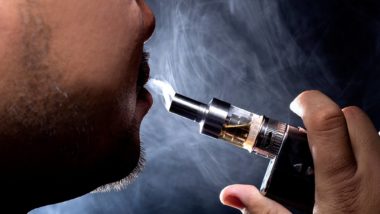Top Class Actions’s website and social media posts use affiliate links. If you make a purchase using such links, we may receive a commission, but it will not result in any additional charges to you. Please review our Affiliate Link Disclosure for more information.
A new study from the Stanford University School of Medicine links vaping in teens with a greater risk of them contracting COVID-19.
Health advocates had already expressed serious concern that more than five million high school and middle school students use e-cigarettes, such as Juul. These children have a five-times greater risk of contracting the new coronavirus. Youth who smoke both regular cigarettes and vape e-cigarettes experience a risk seven times that of a child who does not use nicotine products.
The Journal of Adolescent Health published the study online Aug. 11. Stanford’s research is the first of its kind to delve into the relationship between vaping and the novel coronavirus among America’s youth.
Even though researchers expected young people who vape might have an increased risk, they were taken aback at the extent vaping affected the outcome, according to Dr. Bonnie Halpern-Felsher, who spoke with NBC News about the findings. Halpern-Felsher is the senior author of the research and is professor of pediatrics at Stanford University.
“We were surprised,” said Halpern-Felsher. “We expected to maybe see some relationship… but certainly not at the odds ratios and significance that we’re seeing it here.”
Study Sheds Light on New Danger of Vaping in Teens
Since the COVID-19 pandemic began, experts have considered younger people to be less susceptible to serious illness from the novel virus.
The Stanford study’s lead author and postdoctoral scholar Shivani Mathur Gaiha, PhD said vaping is a serious risk factor.
“This study tells us pretty clearly that youth who are using vapes or are dual-using [e-cigarettes and traditional cigarettes] are at elevated risk, and it’s not just a small increase in risk; it’s a big one,” Gaiha said in a Stanford Medicine press release.
The data included surveys from 4,351 youth ages 13 to 24 from throughout the U.S., the District of Columbia and three U.S. territories. Researchers asked them if they had every used vaping devices or regular cigarettes and whether they had used such a device in the past 30 days. A certain number of participants had never used nicotine products of any kind. All participants were asked if they had been symptomatic of COVID-19, had received a COVID-19 test or a positive COVID-19 diagnosis upon being tested.
The surveys were conducted online in May, at which time most COVID-19 tests were given only to people who were symptomatic. Survey participants who had used both traditional cigarettes and vaping devices in the previous month were nearly five times as apt to report such coronavirus symptoms as coughing, fever, fatigue and difficulty breathing when compared to those who had refrained from ever smoking or vaping.
Researchers hope that their findings are taken seriously by young people, who need to know vaping in teens can lead to myriad health risks. A greater chance of getting COVID-19 is an additional risk that nobody needs.
Link Between Nicotine Use and Coronavirus Complications
Dr. Jonathan Winickoff, professor of pediatrics at Harvard Medical School and MassGeneral Hospital for Children, told NBC News that vaping is “sort of like the anti-mask” and getting youth to quit vaping could help control the current pandemic.

While studies have found that nicotine can harm the developing brain of children and young adults, other ingredients in vaping e-juices are dangerous, too. When the e-cigarette aerosol is inhaled by the user, ultrafine particles can bury deep in lung tissue. Many flavors include diacetyl, which is a chemical that flavored microwave popcorn and led to the development of a disease known as “popcorn lung” in employees who worked at microwaveable popcorn manufacturing facilities back in the 1990s.
Volatile organic compounds, cancer-causing chemicals and heavy metals have all been found in the vaping clouds that vape users inhale.
Even prior to the pandemic, Winickoff warned that vaping in teens was becoming a serious problem that needed immediate attention from regulators.
“I see a flood of kids in my practice who are addicted to Juul,” Winickoff told the Boston Herald in May 2019. “It’s extremely scary.”
Join a Free E-Cigarette Heart & Lung Lawsuit Investigation
If you or a loved one developed heart or lung problems after using e-cigarettes containing nicotine and/or THC, you may qualify to join this e-cigarette lung injury lawsuit investigation. Learn more by filling out the form on this page for a free case evaluation by a JUUL e-cigarette injury lawyer.
ATTORNEY ADVERTISING
Top Class Actions is a Proud Member of the American Bar Association
LEGAL INFORMATION IS NOT LEGAL ADVICE
Top Class Actions Legal Statement
©2008 – 2024 Top Class Actions® LLC
Various Trademarks held by their respective owners
This website is not intended for viewing or usage by European Union citizens.
Get Help – It’s Free
Join a Free E-Cigarette Heart & Lung Injury Lawsuit Investigation
If you qualify, an attorney will contact you to discuss the details of your potential case at no charge to you.
PLEASE NOTE: If you want to participate in this investigation, it is imperative that you reply to the law firm if they call or email you. Failing to do so may result in you not getting signed up as a client or getting you dropped as a client.
E-mail any problems with this form to:
Questions@TopClassActions.com.













